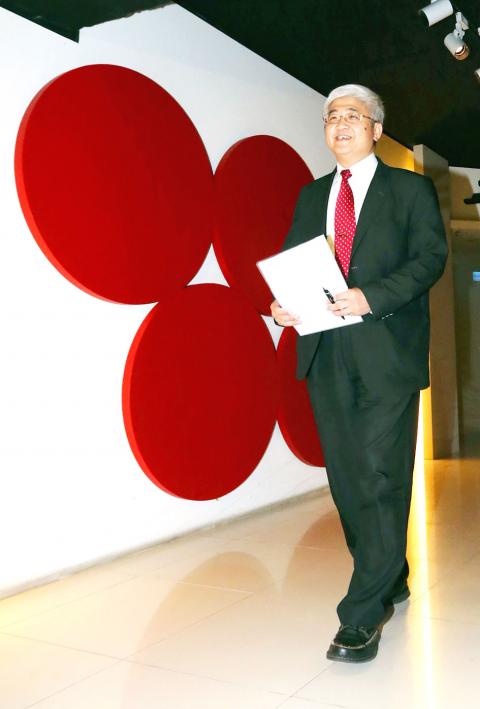Wei Chuan Foods Corp’s (味全食品工業) new chairman yesterday vowed to take bold measures to win back the public’s trust over the safety of its food.
“I hope to lead Wei Chuan back on the right track, with four major directions: raising business ethics, launching a complete food traceability system, improving information disclosure, and corporate social responsibility [CSR],” new Wei Chuan chairman Jason Lee (李鳳翱) told a press conference at the company’s headquarters in Taipei.
Lee, 51, served as chairman of the Consumers’ Foundation in 2005 and 2006.

Photo: CNA
Wei Chuan’s board yesterday approved Lee’s appointment to replace Wei Ying-chun (魏應充), who stepped down last month after the company, its parent company — Ting Hsin International Group (頂新國際集團) — and its affiliated companies were all found to be selling cooking oils made with ingredients unfit for human consumption.
In September, Wei Chuan was forced to recall several of its oil products after they were found to contain recycled cooking oil and oil extracted from industrial grease.
Meanwhile, Cheng I Food Co (正義股份) had been selling 68 lard-based edible oils containing oil meant for use in animal feed and Wei Chuan had used some of those oils in products sold under its own brand.
The discovery sparked outrage, leading consumers to stage a boycott of Ting Hsin and Wei Chuan products.
While expecting Lee to lead the company’s reform in food traceability management and information disclosure, Wei Chuan’s board also elected four new members, after the Wei (魏) family agreed to completely give up their management rights in the firm, a move that is in line with the company’s previous announcement and market expectations.
Shih Hsin University vice principal Chen Ching-ho (陳清河), Taipei Medical University pharmacy professor Cheng Hui-wen (鄭慧文) and National Open University public administration associate professor Johnson Shen (沈中元) took over three board seats vacated by Wei Ying-chiao (魏應交), the second son of the Wei family, Wei Hung-ming (魏宏名), son of Wei Ying-chou (魏應州), the eldest of the four Wei brothers, and Taiwan FamilyMart Co (全家便利商店) chairman Pan Chin-ting (潘進丁), who represented the Wei family and stepped down last month.
Wei Chuan’s board also elected accountant Charles Chen (陳永清) as one of the two supervisors in the 11-member board, which has nine directors.
Chen replaced Frank Lin (林清棠), vice president of Tingyi (Cayman Islands) Holding Corp (康師傅控股), which is best known for its Master Kong brand and is also owned by the Wei family.
The Wei family still holds a 40.4 percent stake in Wei Chuan.
However, Lee said the Wei family has promised him complete run of the firm’s management, with no interference or resistance to the new Wei Chuan board’s operations.
“I will never be a rubber stamp or puppet” of the Wei family, Lee said.
Wei Chuan’s stock surged by the daily limit of 7 percent yesterday to close at NT$28.2 on the Taiwan Stock Exchange.
Additional reporting by CNA

DAREDEVIL: Honnold said it had always been a dream of his to climb Taipei 101, while a Netflix producer said the skyscraper was ‘a real icon of this country’ US climber Alex Honnold yesterday took on Taiwan’s tallest building, becoming the first person to scale Taipei 101 without a rope, harness or safety net. Hundreds of spectators gathered at the base of the 101-story skyscraper to watch Honnold, 40, embark on his daredevil feat, which was also broadcast live on Netflix. Dressed in a red T-shirt and yellow custom-made climbing shoes, Honnold swiftly moved up the southeast face of the glass and steel building. At one point, he stepped onto a platform midway up to wave down at fans and onlookers who were taking photos. People watching from inside

A Vietnamese migrant worker yesterday won NT$12 million (US$379,627) on a Lunar New Year scratch card in Kaohsiung as part of Taiwan Lottery Co’s (台灣彩券) “NT$12 Million Grand Fortune” (1200萬大吉利) game. The man was the first top-prize winner of the new game launched on Jan. 6 to mark the Lunar New Year. Three Vietnamese migrant workers visited a Taiwan Lottery shop on Xinyue Street in Kaohsiung’s Gangshan District (崗山), a store representative said. The player bought multiple tickets and, after winning nothing, held the final lottery ticket in one hand and rubbed the store’s statue of the Maitreya Buddha’s belly with the other,

‘NATO-PLUS’: ‘Our strategic partners in the Indo-Pacific are facing increasing aggression by the Chinese Communist Party,’ US Representative Rob Wittman said The US House of Representatives on Monday released its version of the Consolidated Appropriations Act, which includes US$1.15 billion to support security cooperation with Taiwan. The omnibus act, covering US$1.2 trillion of spending, allocates US$1 billion for the Taiwan Security Cooperation Initiative, as well as US$150 million for the replacement of defense articles and reimbursement of defense services provided to Taiwan. The fund allocations were based on the US National Defense Authorization Act for fiscal 2026 that was passed by the US Congress last month and authorized up to US$1 billion to the US Defense Security Cooperation Agency in support of the

‘COMMITTED TO DETERRENCE’: Washington would stand by its allies, but it can only help as much as countries help themselves, Raymond Greene said The US is committed to deterrence in the first island chain, but it should not bear the burden alone, as “freedom is not free,” American Institute in Taiwan Director Raymond Greene said in a speech at the Institute for National Defense and Security Research’s “Strengthening Resilience: Defense as the Engine of Development” seminar in Taipei yesterday. In the speech, titled “Investing Together and a Secure and Prosperous Future,” Greene highlighted the contributions of US President Donald Trump’s administration to Taiwan’s defense efforts, including the establishment of supply chains for drones and autonomous systems, offers of security assistance and the expansion of